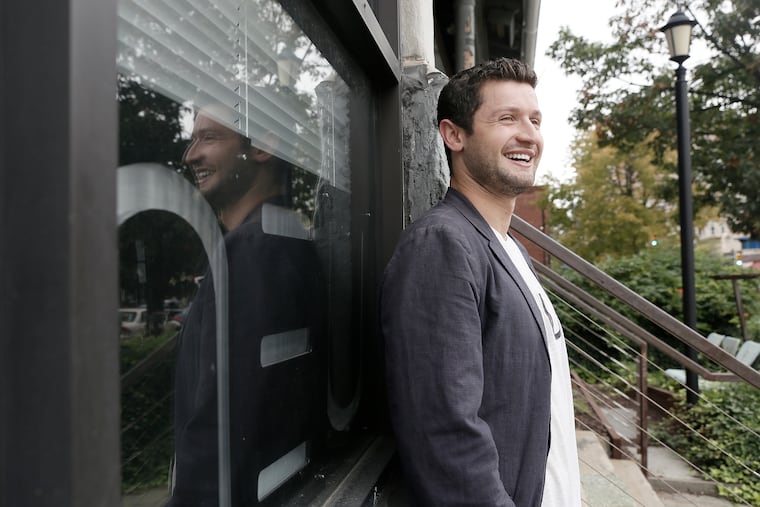How his brother’s diabetes drove one Philly clothing entrepreneur to new heights
Daniel Fine's Neu LLC is lighting up the licensed sports apparel market with techniques drawn from the world of fast fashion. Neu topped the Philadelphia 100 list of fastest growing companies for the second year in a row.

Daniel Fine attributes his business success — the multiple brands, surging revenue, and national recognition — to his brother Jake's diagnosis of Type 1 juvenile diabetes almost 15 years ago, and his family's commitment to do all it could to improve his life.
As the family solicited donations for "Team Brotherly Love," a nonprofit raising money for diabetes research, Fine noticed that most donors were parents. So Fine and his brother targeted their kids, and made lacrosse apparel with logos about the effort. They sold out over a couple of weekends.
More than a decade later, Fine, a Princeton native, is the founder and chief executive of Neu LLC, which had $7.1 million in revenue last year, up from $286,691 in 2015 and $177,457 in 2014. That surge landed Neu at the top of the Philadelphia 100 list of fastest-growing companies for the second year in a row.
"We learned to motivate kids to market products," said Fine, 25, and how to raise money from investors and donors. "Most importantly, I realized how cool it was to create something where you'd be walking around your own town or be traveling on the other side of the world, and see someone randomly wearing what you've created," he said. "That was when I became obsessed with building brands."
Fine's company is one of many in the large licensed sports apparel market, a $7.8 billion industry that experienced 2.3 percent annual growth from 2013 to 2018, according to IBISWorld, a market research company. College athletic apparel made up 27.1 percent of the total, the report said. That popularity has encouraged colleges to go beyond jerseys, T-shirts, and outerwear, and sell performance apparel, socks, sunglasses, and other accessories.
When Fine was accepted into Penn, he saw an opportunity to make sunglasses representing something that he and his peers cared about — their university. Sunglasses of decent quality with "Penn '15" on the side would be "such a cool fratty product that everyone would wear," he recalled thinking at the time. "Why can't I find anything that's like this?"
If there was a market for it at the University of Pennsylvania — arguably "not the most rah-rah school," he acknowledges — there would be more demand in the greater collegiate market. So Fine created Glass-U, a company selling folding, customizable sunglasses. He would go on to secure licensing to print logos on sunglasses from NCAA colleges and universities, music festivals like SXSW and Lollapalooza, and the World Cup.
Success with sunglasses inspired him to expand. Those sunglasses are now just one brand under the Neu umbrella. In the last two years, Neu, which has retail and custom divisions, acquired chicka-d apparel for women and kids, expanded NCAA rights for other products, and secured licensing rights to become sole distributor for pullover maker Woolly Threads. The company also has an exclusive deal with talent agency WME/IMG and Turner Broadcasting on eLeague, a professional e-sports league, and Neu sells apparel and accessories for the online survival game Fortnite at E3, a gaming conference.
While many brands and products targeting millennial and college-age people are run by older generations, Neu is not.
"Companies like ours, where we are our own market … gives us a step above in understanding our customer base," Fine said.
Neu is also tapping techniques from fast fashion, where companies like Zara and H&M are able to design and turn out new clothing sometimes in a few weeks. "We're bringing fast fashion into the licensing space," Fine said last year. "We're doing it in two ways. A, we're making cool, fashionable licensed products. B, we're constantly innovating those products and those graphics.
"The same Champion sweatshirt has been sold forever, to put it simply. For us, we're trying to develop those next products that are going to become the staples of the ecosystem and innovate them constantly."
Neu's main markets are university bookstores and other collegiate apparel shops. Consumers can also buy university-specific, $15 foldable glasses and a matching pouch, $10 woven bracelets, and $10 cell phone wallets online.
Fine's other entrepreneurial efforts include Dosed, an app to track insulin dosages for people with diabetes, and MatchTutors, a tutoring company that takes into account personality and interests when pairing a student with an academic tutor.
"I have a long way to go. I mean, this is the very beginning of my career," Fine said. "This is my first real company, but I want to make a very substantial impact on the world."
Neu has grown from one or two employees during Fine's senior year to 30, most in offices in Philadelphia and Austin. Fine recalled some rocky patches, such as deliveries held up at the border, running out of money, and glasses breaking instead of folding.
Fine declined to share details on his financial backing.
Though Fine no longer runs Neu out of his dorm room, its offices are still within walking distance of his alma mater. The walls are decorated with items including a poster that reads, "The worst decision is indecision," an American flag, framed copies of news coverage, and a mini basketball hoop.
Fine's favorite business to date is Dosed, the app he co-created with his brother, but, he said, "Neu is the priority by a long shot. Neu is really all I do at this point.
"What we're doing now, we make people happier. They get something they care about. … There's meaning to that," Fine said. "At the same time, if I can save lives and really have that type of impact, that's a whole `nother level, and that's eventually what I see myself getting back to."